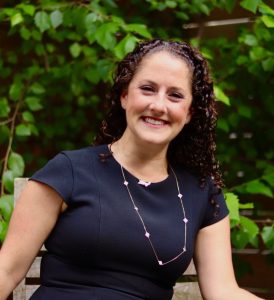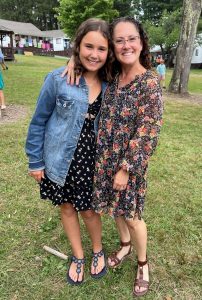
Before the pandemic, Miryam Seid traveled across the country with her husband, Adam, to visit her childhood camp, Ramah in California. The camp was hosting a family experience during Passover. But for Miryam Seid, it was a chance to see the place where she became herself.
Seid, now 43, spent eight summers there, back when it was called Ramah Ojai after its town, from 1989-’96. She still credits the place for giving her a Jewish identity via a connection with other Jews and seeing the Jewish lessons behind all experiences. So when she returned for the first time in more than 20 years, her husband saw it all over her face.
“She just looked so alive,” he said.
Less than five years later, Seid is back on a Ramah campus full time, and she’s running the place. It’s not the same oasis in Southern California. But for the Wynnewood resident, it’s the East Coast version: In February, Seid took over as the executive director of Camp Ramah in the Poconos.
“This is a marriage of passion and profession,” she said. “It’s a tremendous responsibility, but I love the road ahead. I already know that.”
Seid graduated from Columbia University and the Jewish Theological Seminary in the early 2000s, earning degrees in American history and Jewish studies. At JTS, she also took a work-study position in its institutional advancement department. It made her realize that she had a passion for “development work,” according to her profile on Ramah’s website.

For the next decade-plus, Seid worked for Jewish organizations. She served as an advancement director at JTS and as special events coordinator at the Mount Sinai Children’s Center Foundation, both in New York City. The Seids moved to the Philadelphia area in 2013 so Adam Seid could take a pharmaceutical job. After staying home for a few years following the birth of her son, Miryam Seid became an advancement director at the University of Pennsylvania’s Hillel chapter.
During her three years at Penn Hillel, camp was, as Adam Seid described it, a “pipe dream.” When the couple walked around Ramah in California that Passover, they talked about how cool it would be to become a camp family. But Adam Seid also reminded his wife that she was not just going to take a job as a counselor.
She knew he was right. So, she found a solution.
In 2019, Miryam Seid saw online that there was an opening at Camp Ramah for a director of institutional advancement. She applied and got it. Her role? Calling donors and asking for money, a position that became vital during the canceled COVID summer of 2020. But Seid knew what she was doing. She would always start calls with the same question.
“What’s your Ramah story?”
“People always want to talk about their Ramah story,” she added.
Seid did such a good job that Ramah now gives out $350,000 in scholarship funds per year, a number that has gone up over the past four years. Coming out of COVID, Ramah has more campers than it did in 2019 and the longest waitlist in its history, according to Seid.
Those successes convinced Rabbi Joel Seltzer, Ramah’s previous executive director, that Seid could replace him. Seltzer announced in September that he would be leaving his position after more than 10 years. His chief fundraiser informed him that she would be applying, and the rabbi was both “thrilled” and “relieved,” he said.
More important than her fundraising skills is her “moral compass that points to true north,” Seltzer explained. In 2021, Ramah implemented a bubble to prevent COVID from entering. Due to the challenge of bringing in international staff members, the camp’s operations team had only eight workers, compared to its usual roster of more than 40. Seid responded by helping out. She washed dishes in the kitchen, served food in the buffet line and packed bunks with fourth-grade boys.
“She has an incredible talent for connecting deeply with people and understanding complex situations,” Seltzer said.
When Seid got the offer, she called it a “dream come true,” and she still feels that way. Adam Seid sees it when she comes home from work. She walks in with the same “extreme happiness” that she brought to the day, he said.
The Seids belong to Adath Israel on the Main Line. They go to the synagogue on Shabbat and “do a lot of hosting for Shabbat dinners,” Miryam said. The mother encourages her two children to invite their friends. She compares it to Ramah.
“It’s spirited; it’s joyful; it’s filled with family and friends,” she said. ■






